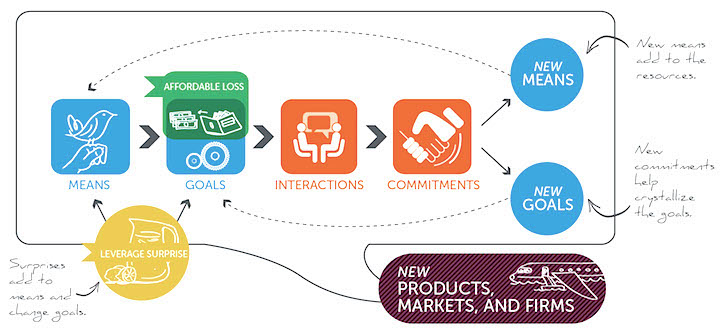Effectuation is a logic of thinking, discovered through scientific research, used by expert entrepreneurs to build successful ventures.
Saras Sarasvathy, a professor at the University of Virginia’s Darden School of Business, made a research with a group of entrepreneurs. The participants had over 15 years of experience, had founded multiple ventures including both successes and failures with revenue from $200 million to $6.5 billion. From her results, Professor Sarasvathy co-operated with Professor Stuart Reed, from IMD business school in Switzerland at that time, to implement more experiments. She then concluded that expert entrepreneurs rely on what she calls effectual reasoning.
The starting principle for that is that entrepreneurs do not start out with concrete goals, but they keep assessing their strengths and resources for developing new goals while operating a business. By contrast, corporate managers usually apply causal reasoning where they set a goal first and seek the best way to achieve that goal.

Effectuation means flexible.
Applying effectual thinking logic, expert entrepreneurs do not predict the future. They focus on what they have in hand (bird-in-hand principle), and manage what they can control. They set an acceptable downside (affordable-loss principle) before doing business, then just focus on what they are doing. The new means and opportunities can appear in the future. At that time, entrepreneurs can catch those uncertainties and convert them to new goals (lemonade principle). They can even expand their business by forming partnerships with people and organizations that are willing to make real commitments for creating future products and markets (crazy-quilt principle).
What are we doing with effectuation framework?
At OsloNAP, we frequently discuss with customers and ask them different questions, such as:
- How much time and effort do they spend for managing the business uncertainties?
- How do they recognize opportunities and convert them to business goals?
- How do they manage relationships between their business and customers, and their partners?
Results from entrepreneurs’ answers, combining with effectuation framework, we co-operate with customers to create better plans for their businesses. Are you ready to join? If you still have any concern, you might want to read our effectuation articles first and email us your thought. Surely we can work out.

